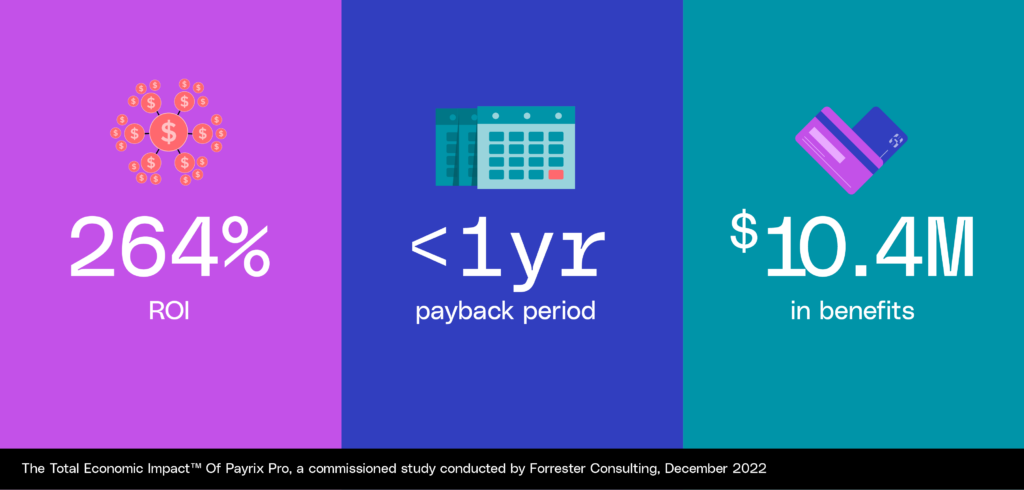Key Findings
- Software companies can realize financial benefits of $10.4 million across three years
- Businesses may make up to 125 percentage points of profit on transaction volumes
- Savings from reduced payment processing costs valued at $1.6 million
- Your software company could realize a 264% return on investment (ROI) within three years of implementing Payrix Pro, according to a Forrester study.
Download The Forrester TEI™ Study
Forrester’s findings may be useful to you if your software business is looking for a technology partner to embed payments. And they could be highly relevant if you’re actively considering how you can use Embedded Payments to lift your revenue per customer, while limiting your processing costs.
The pains of payments
Experienced software executives know all about the frustrations of managing customer and merchant payments. Customers have high expectations for simple checkouts and easy subscription renewals. But those expectations can often clash with a merchant’s need to prevent fraud and earn more from rising payment volumes.
The Forrester study, which we commissioned, highlights the problems four software businesses were experiencing before using Payrix Pro.
- Each company offered different payment integrations to merchants
- Legacy processes caused ‘friction’ and poor customer experiences
- And the companies were missing out on revenue-generating opportunities
“[Our] pain points were having and maintaining multiple processors and integrations and not being able to monetize. We had a lot of [payments] volume. But we weren’t really making much from that volume,” the vice president of a software business told Forrester.
Breaking even
Payrix Pro customers reached a breakeven point for their initial investment in under a year, according to Forrester’s analysis. Customers can go on to realize financial benefits of $10.4 million over three years versus costs of $2.8 million. The costs were related to:
- Payrix Pro’s licensing and transaction fees
- implementation and change management
- and ongoing dedicated program management
The findings are significant, given the growing importance of payments to successful software-as-a-service (SaaS) companies. Forrester describes payments as the ‘invisible invaluable’ because they are central to how merchants make money.
Forrester’s 3 key findings about our impact

The study contains numerous additional insights for software platforms and marketplaces that want to embed payment capabilities. With Payrix Pro, your company may be able to:
- Gain more share of transaction revenue. Businesses that facilitate payments for merchants can achieve up to 125 percentage points of profit on their transaction volumes.
- Cut payment processing costs. Customers can avoid higher processing costs for their SaaS subscription revenues. Forrester valued savings from reduced processing costs at $1.6 million.
- Realize broader operational benefits. Businesses also reported reduced payment fraud, better customer retention, and a decreased burden on customer service teams.
“We partnered with Payrix to create a much better experience for our platform sellers and buyers and to leverage their embedded technology, industry expertise, support, and account management capabilities,” said the VP of finance and strategy for a marketplace company.
“Buyers are getting value and operating in a more frictionless world. Sellers have more security and get paid faster, so they can run their business more efficiently. We are fortunate to facilitate that with Payrix, it’s been a four-way win.”
Forrester obtained its findings by interviewing four Payrix Pro customers about the costs, benefits, and risks of using our payments-facilitation-as-a-service solution.
The interviewees are VP and C-level executives working at software businesses in marketplaces, education, construction, and the non-profit sector. The participating customers have annual revenues spanning from $30 million to $100 million.
Forrester then designed a composite organization and a financial model based on the characteristics of these companies and the consultancy’s globally recognized Total Economic ImpactTM (TEI) methodology.